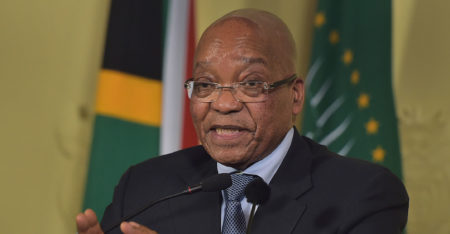
President Jacob Zuma survived the most serious challenge to his leadership yet, after a contingent of top officials failed to force him from office during a meeting of the ruling party’s national executive committee.
The committee, which ended a three-day meeting late on Monday, said that the top six members of the ruling ANC would discuss Zuma’s fitness to remain president before a consultative conference next year, two members of the committee who were at the meeting said on condition of anonymity.
The committee, the most powerful party body between national conferences held every five years, has the power to order Zuma to resign as president of the country, not as leader of the ANC.
Zuma’s seven-year tenure as president has been marred by a succession of scandals and policy missteps that have weighed on the rand and put the nation’s investment-grade credit rating at risk.
While Zuma, 74, has survived several previous challenges to his leadership, the fact that members of his own cabinet have openly turned against him is the clearest sign yet that his grip on power is slipping. He’s scheduled to step down as the ANC’s leader in December next year and his second term as president ends in 2019.
“Although Zuma lives another day, his power is clearly waning,” Anne Fruhauf, vice-president at New York-based risk adviser Teneo Intelligence, said by e-mail. “Investors are concerned that the president may go for broke in the wake of the bruising NEC meeting. A cabinet reshuffle seems almost inevitable.”
Tourism minister Derek Hanekom on Saturday proposed the motion of no confidence in Zuma. Those also calling for him to step down were health minister Aaron Motsoaledi, public works Minister Thulas Nxesi, science & technology minister Naledi Pandor, and Jackson Mthembu, the ANC’s chief whip in parliament, Johannesburg-based broadcaster eNCA reported, without saying where it got the information.
The rebellion within the ANC comes almost a month after the nation’s graft ombudsman released a report indicating that Zuma may have allowed members of a wealthy family, who are his friends and in business with his son, to influence cabinet appointments and the awarding of state contracts. Zuma denies the allegation and is challenging the ombudsman’s findings in court.
In March, the nation’s top court ruled that he violated his oath of office by refusing to repay taxpayer funds spent on upgrading his private home. In August, the ANC suffered its worst electoral performance in a local government vote, losing control of Pretoria and Johannesburg.
The rand strengthened the most in almost a month earlier Monday, leading global gains against the dollar, climbing as much as 2,8%. It weakened 0,4% to R13,78/US$ as of 12.28am in Johannesburg.
South Africa moved closer to a junk credit rating after Fitch Ratings on Friday changed the outlook on its assessment to negative from stable and said that continued political instability could result in a downgrade. Political risks to the standards of governance and policy making have increased and will remain high at least until the ANC leadership election in December next year, Fitch said in an e-mailed statement. Moody’s Investors Service left the country’s rating at two levels above non-investment grade.
“The ANC national executive committee is no longer insulated or seemingly impenetrable to pressures from the ANC branches and formations in opposition to Zuma,” said Daniel Silke, director of the Political Futures Consultancy in Cape Town. — (c) 2016 Bloomberg LP




